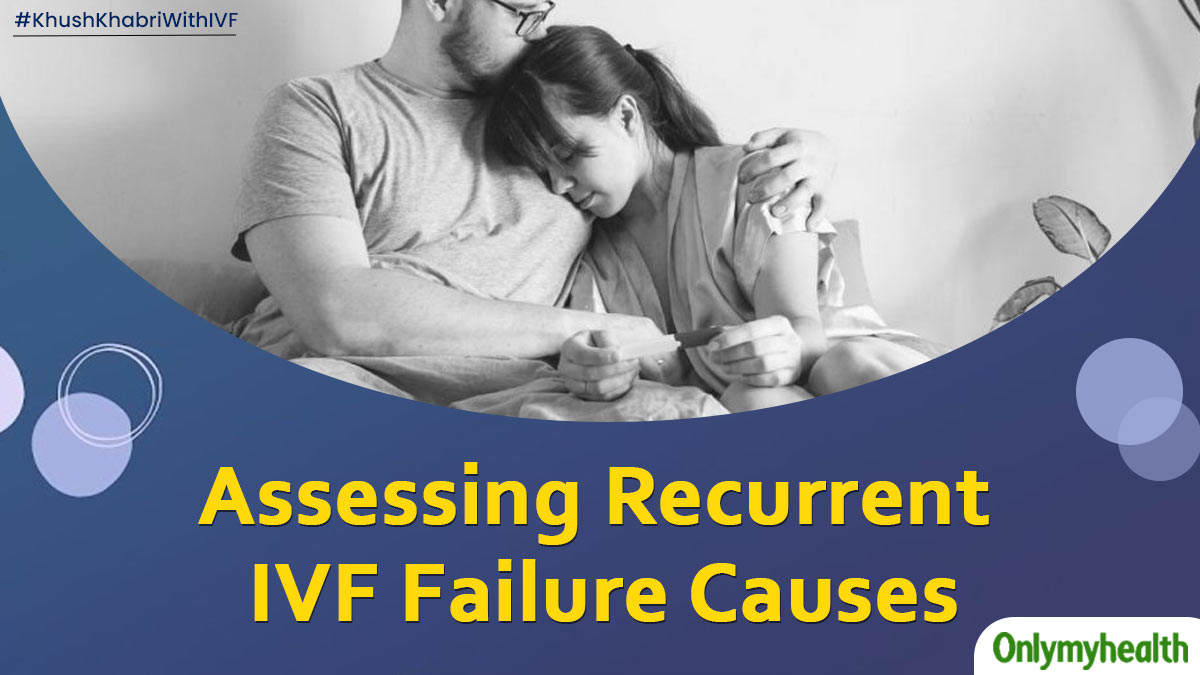
#KhushKhabriWithIVF: The number of couples undergoing in vitro fertilisation (IVF) treatment has been on the rise in recent years. Recurrent implantation failure (RIF) is affected by an estimated 5-10% of women undergoing IVF. IVF is a complex and emotionally charged journey that involves numerous medical procedures, meticulous monitoring, and intense hopes for success. For some couples multiple IVF attempts may end in recurrent failures. These failures can be devastating leaving couples wondering what steps to take next. Under our ‘Khush Khabri With IVF’ campaign, Dr Usha BR, Consultant - OBGYN, Fertility & Laparoscopic Surgeon, Fortis Hospital, Bannerghatta Road, Bengaluru talks about the next step that couples should take after experiencing recurrent failures in IVF procedure.
Table of Content:-
What Can Be Done After Recurrent IVF Failure?
When faced with recurrent IVF failures it is crucial to consider various factors and diagnostic tests that can help shed light on the potential underlying causes.
Human Leukocyte Antigen
One such test is HLA typing of the couple. Human Leukocyte Antigen (HLA) genes play a significant role in the immune system's response including embryo implantation and maintenance of pregnancy which looks at how well the couple's immune systems match up.
Also Read: Expert Answers 5 Questions On How To Get Pregnant With IVF

Non-Invasive Chromosomal Screening of Embryos (NICS)
“It is an advanced genetic test that can help identify chromosomal abnormalities in embryos without the need for invasive procedures. Identifying abnormalities in the embryo's chromosomes can help determine the potential reason behind recurrent IVF failures. This can help understand why IVF treatments may have failed in the past and guide future treatment strategies,” shares Dr Usha.
Genotype assessment
This crucial test involves analysing the genetic makeup of both partners to identify any potential genetic factors contributing to IVF failures. As per Dr Usha, this assessment can help determine if certain genetic conditions or mutations are affecting the embryo development and implantation allowing for more targeted treatment approaches.
The Endometrial Receptivity Assay test (ERA)
This assesses the receptivity of the uterine lining, which is key to embryo implantation success. It involves taking a small biopsy to determine the best time for implantation. This test helps couples identify the optimal window of receptivity to increase their chances of successful implantation.
Also Read: Fresh Vs Frozen Embryo Transfer in IVF, Which Is Better?

What Are The Treatment Options?
After undergoing these thorough diagnostic tests and identifying the potential underlying causes of recurrent IVF failures couples can explore various treatment options. Dr Usha suggests immunomodulatory therapy to improve embryo implantation and reduce rejection chances, which may involve taking medications to suppress or promote immune tolerance.
Sub endometrial injection of PRP (Platelet-rich-plasma) and stem cells (found in many tissues in the body, including the bone marrow, umbilical cord blood, and placenta) is a minimally invasive procedure that involves injecting these substances into the lining of the uterus. This is done in the hope of improving the quality of the endometrium and increasing the chances of implantation of an embryo.
Also Read: Natural IVF Vs. Conventional IVF: Understanding the Differences
A Ray Of Hope
"Personalised treatment protocols tailored to the individual needs of the couple can greatly improve the chances of success. Collaborating with a team of fertility specialists who have expertise in recurrent IVF failures can help design a comprehensive treatment plan that addresses specific challenges identified through diagnostic tests,” concludes Dr Usha.
While recurrent IVF failures can be disheartening, it is essential to remain hopeful and pursue alternative options. Assisted reproductive technologies are continually advancing offering new possibilities and solutions. Alongside medical interventions, seeking emotional support, counselling, and joining support groups can also help couples navigate the emotional toll that recurrent IVF failures can bring. Couples can explore the various treatment options. Through a combination of medical advancements, emotional support, and perseverance, the hopes of achieving a successful pregnancy can be ensured.
Also watch this video
How we keep this article up to date:
We work with experts and keep a close eye on the latest in health and wellness. Whenever there is a new research or helpful information, we update our articles with accurate and useful advice.
Current Version
